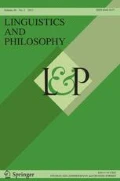References
Abusch, Dorit: 1985,On Verbs and Time, University of Massachusetts doctoral dissertation.
Bach, Emmon: 1980, ‘Tenses and Aspects as Functions on Verb-Phrases’, in C. Rohrer (ed.),Time Tense and Quantifiers: Proceedings of the Stuttgart Conference on the Logic of Tense and Quantification, Niemeyer, Tübingen, pp. 19–38.
Bach, Emmon: 1981, ‘On Time, Tense and Aspect: An Essay in English Metaphysics’, in P. Cole (ed.),Radical Pragmatics, Academic Press, New York, pp. 63–81.
Bauer, Gero: 1970, ‘The English ‘Perfect’ Re-considered’,Journal of Linguistics 6, 189–198.
Bennett, David C.: 1975,Spatial and Temporal Uses of English Prepositions: An Essay in Stratificational Semantics, Longman, London.
Bennett, Michael: 1981, ‘Of Tense and Aspect: One Analysis’, in P. J. Tedeschi and A. Zaenen (eds.),Syntax and Semantics 14: Tense and Aspect, Academic Press, New York, pp. 13–29.
Bennett, Michael and Barbara H. Partee: 1972, ‘Toward the Logic of Tense and Aspect in English’, Systems Development Corporation, Santa Monica, California.
Carlson, Gregory: 1980,Reference to Kinds in English, Garland, New York.
Comrie, Bernard: 1976,Aspect: An Introduction to the Study of Verbal Aspect and Related Problems, Cambridge University Press, Cambridge.
Declerck, Renaat: 1979, ‘Aspect and the Bounded/Unbounded (Telic/Atelic) Distinction’,Linguistics 17, 761–794.
Dowty, David: 1979,Word Meaning and Montague Grammar, D. Reidel, Dordrecht.
Emonds, Joseph E.: 1976, A Transformational Approach to English Syntax: Root, Structure-Preserving and Local Transformations, Academic Press, New York.
Gabbay, Dov and Julius Moravcsik: 1980, ‘Verbs, Events and the Flow of Time’, in C. Rohrer (ed.),Time, Tense and Quantifiers, Niemeyer, Tübingen, pp. 59–84.
Gazdar, Gerald, Geoffrey K. Pullum, and Ivan A. Sag: 1982, ‘Auxiliaries and Related Phenomena in a Restrictive Theory of Grammar’,Language 58, 591–638.
Goldsmith, John and Erich Woisetschlaeger: 1982, ‘The Logic of the English Progressive’,Linguistic Inquiry 13, 79–89.
Goodwin, William W.: 1889,Syntax of the Moods and Tenses of the Greek Verb, Macmillan, London.
Hatcher, Anna G.: 1951, ‘The Use of the Progressive Form in English’,Language 27, 254–280.
Heny, Frank: 1982, ‘Tense, Aspect and Time Adverbials, Part II’,Linguistics and Philosophy 5, 109–154.
Jackendoff, Ray: 1978, ‘Grammar and Evidence for Conceptual Structure’, in M. Halle, J. Bresnan and G. A. Miller (eds.),Linguistic Theory and Psychological Reality, MIT Press, Cambridge, Mass., pp. 201–228.
Jespersen, Otto: 1931,A Modern English Grammar on Historical Principles, Part IV, Allen and Unwin, London.
Inoue, Kyoko: 1978, ‘How Many Senses Does the English Perfect Have?’,Papers from the Fourteenth Regional Meeting, Chicago Linguistics Society, pp. 167–178.
Kamp, Hans and Christian Rohrer: 1983, ‘Tense in Texts’, in R. Bäuerle, C. Schwarze and A. von Stechow (eds.),Meaning, Use and Interpretation of Language, De Gruyter, Berlin, pp. 250–269.
Kenny, Anthony: 1963,Action, Emotion and Will, Routledge, London.
König, Ekkehard: 1980, ‘On the Context-Dependence of the Progressive in English’, in C. Rohrer (ed.),Time, Tense and Quantifiers, Niemeyer, Tübingen, pp. 269–292.
Ladusaw, William A.: 1980,Polarity Sensitivity as Inherent Scope Relations, Indiana University Linguistics Club, Bloomington, Indiana.
Leech, Geoffrey N.: 1969,Towards a Semantic Description of English, Longman, London.
Leech, Geoffrey N.: 1971,Meaning and the English Verb, Longman, London.
Lyons, John: 1977,Semantics, Cambridge University Press, Cambridge.
McCawley, James D.: 1971, ‘Tense and Time Reference in English’, in C. J. Fillmore and D. T. Langendoen (eds.),Studies in Linguistic Semantics, Holt, Rinehart and Winston, New York, pp. 97–113.
McCawley, James D.: 1981a,Everything that Linguists Have Always Wanted to Know about Logic but were Ashamed to Ask, University of Chicago Press, Chicago.
McCawley, James D.: 1981b, ‘Notes on the English Present Perfect’,Australian Journal of Linguistics 1, 81–90.
McCoard, Robert W.: 1978,The English Perfect: Tense-Choice and Pragmatic Inferences, North-Holland Publishing Company, Amsterdam.
Meulen, Alice ter, 1983, ‘The Representation of Time in Natural Language’, in Alice G. B. ter Meulen (ed.),Studies in Modeltheoretic Semantics, Foris, Dordrecht, pp, 177–191.
Mittwoch, Anita: 1977, ‘Negative Sentences with Until’,Papers from the Thirteenth Regional Meeting, Chicago Linguistics Society, pp. 410–417.
Mittwoch, Anita: 1982, ‘On the Difference between Eating and Eating Something’,Linguistic Inquiry 13, 113–121.
Mourelatos, Alexander, P. D.: 1978, ‘Events, Processes, and States’,Linguistics and Philosophy 2, 415–434. Reprinted in Philip Tedeschi and Annie Zaenen (eds.),Syntax and Semantics 14:Tense and Aspect, Academic Press, New York, pp. 191–212.
Palmer, Frank R.: 1974, The English Verb, Longman, London.
Partee, Barbara H.: 1984, ‘Compositionality’, in F. Landman and F. Veltman (eds.),Varieties of Formal Semantics, Foris, Dordrecht.
Prior, Arthur: 1967,Past, Present and Future, Oxford University Press, Oxford.
Richards, Barry: 1982, ‘Tense, Aspect and Time Adverbials, Part I’,Linguistics and Philosophy 5, 59–107.
Taglicht, Joseph: 1983,Message and Emphasis: On Focus and Scope in English Longman, London.
Taylor, Barry: 1977, ‘Tense and Continuity’,Linguistics and Philosophy 1, 199–220.
Traugott, Elizabeth Closs and Waterhouse, John: 1967, ‘‘Already’ and ‘Yet’: A Suppletive Set of Aspect-Markers?’,Journal of Linguistics 5, 287–304.
Vendler, Zeno: 1967,Linguistics in Philosophy, Cornell University Press, Ithaca, New York.
Vlach, Frank: 1981, ‘The Semantics of the Progressive’, in P. J. Tedeschi and A. Zaenen (eds.),Syntax and Semantics 14:Tense and Aspect, Academic Press, New York, pp. 271–292.
Author information
Authors and Affiliations
Rights and permissions
About this article
Cite this article
Mittwoch, A. Aspects of english aspect: On the interaction of perfect, progressive and durational phrases. Linguist Philos 11, 203–254 (1988). https://doi.org/10.1007/BF00632461
Issue Date:
DOI: https://doi.org/10.1007/BF00632461

